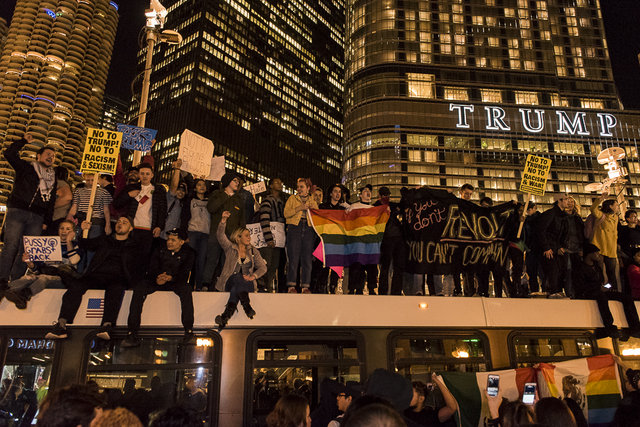Why People Over 25 Need To Get In The Streets Right Now
By Anthony Todd in News on Nov 10, 2016 8:30PM

(Photo by Tyler LaRiviere/Chicagoist)
Wednesday night, a convulsive wave of protests swept cities all over America. For now, the protests are spontaneous, not particularly focused around a particular issue, and are more concerned with venting sadness and fear than making actual change, since until President Trump takes office, there isn't much change to be made.
But after witnessing last night's protest in Chicago first-hand, I have this to say: older people and professionals need to get out of their offices and into the streets, and they need to do it right now.
Actual street protesting has, at least in recent American history, been an occupation primarily of the young. Occupy Wall Street and Black Lives Matter, like many other protest groups, have trended young and gotten huge support on college campuses. But it hasn't always been so. While young people certainly played a huge part in the Civil Rights, Anti-War, Feminist and Gay Liberation movements, they weren't alone; leaders from business, law, medicine, the church and other institutions joined the fight. Professionals from all areas joined the fight. People over 30 joined the fight. And that fight included getting out and being seen as part of non-violent demonstrations.
If you want to see change, that needs to happen again.
Last night's protest was filled with inspiring moments, as you can see from our many other posts on the subject. But I was startled to see how dominated it was by young people of color and young people self-identifying as sexual minorities. I was easily the oldest person in my line of vision most of the time (I'm 34) and definitely the only person wearing business clothes and carrying a briefcase. There were a lot of languages being spoken and a lot of rainbow flags waving.
But thousands more people more "like me" (by that I mean older and in professional dress, and mostly white) lined the streets and sidewalks watching, usually with their iPhones out filming. They seemed enthusiastic about what the marchers were doing, but didn't actually step off the curb and join in.
Until recently, those onlookers probably would have included me. I've never been much of a protestor, and when I have participated, it's been in my capacity as an attorney, as I acted as a legal observer during the NATO demonstrations. I've been much more of a commenter, a donator, a watcher and a complainer. Sure, I'd give a cheer or honk a horn if I saw a good march, but I wouldn't actually join. That's for those kids, right? We're too old, and too dignified, for that sort of thing.
The time for that kind of thinking is, for better or for worse, over. The United States has elected a president whose policies and supporters threaten a huge variety of minority groups. He threatens the economy. He threatens the physical safety of the nation.
If you think these things (and in Chicago, a huge majority of you do), why does it matter if you're over 30, wearing a tie, or have a decent job? In fact, it is incumbent upon you, the powerful—and yes, you are relatively powerful even though you might not feel that way if you have a job and your skin isn't brown—to help advocate for the most vulnerable among us who would be challenged by a Trump administration. That duty includes making sure that not only those most vulnerable are seen visibly protesting.
Many of my professional colleagues will disagree with me. Protests aren't actually aimed at anything, they might say, or don't accomplish anything concrete. They're wrong. The dominant news story this morning was that thousands of people are scared of our new president and showed that fear through (almost entirely non-violent) action. In the coming months, when President Trump proposes a particular scary policy or says something particularly offensive, do you want to take the news cycle away from him? Get in the streets.
Maybe the protests are a little too enthusiastic for you. OK, then join until you don't feel comfortable. I didn't climb a bus or run down Lakeshore Drive. Maybe you can't have an arrest record because of your job. You don't have to do anything illegal. People generally aren't rounded up by the thousands and arrested for marching in this town. Maybe you feel a little bit uncomfortable when the protestors denounce the "1 percent," and you make a fairly good living. OK, you don't have to join in every chant. But one great way to remind people that this isn't only about class and wages is to show up and remind them that people of all income levels and colors share their fears and ideals.
You can't let other people do your fighting for you. That's not how democracy works. If you want to complain about racism, homophobia, xenophobia, potential economic collapse and war, then you have to actually fight it. Yourself.
There are a million reasons, from the reaction of potential customers to the feelings of your colleagues and friends who think active protest is silly, not to get involved. But all of them pale next to this: Donald Trump is now the president of the United States. So next time you hear about a protest or see it marching past, put down your phone and join in.